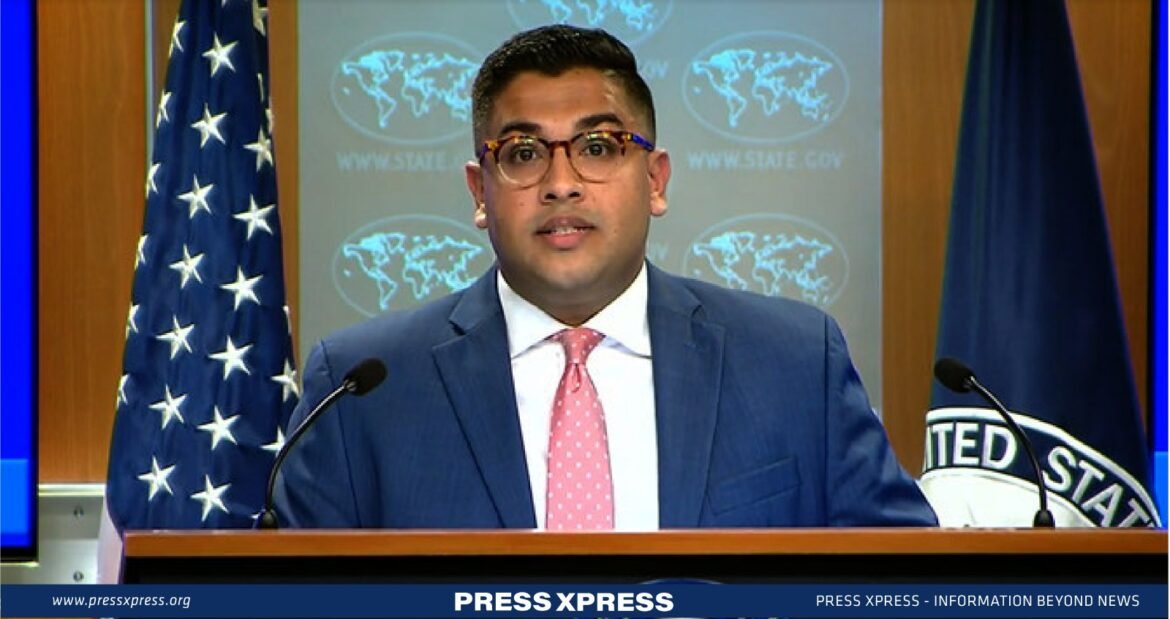Assistant Press Secretary Vedant Patel of the US State Department has unequivocally expressed his grave concerns about the Bangladesh Nationalist Party’s (BNP) ongoing violence linked to the hartal-blockade activities. In a regular press briefing held in Washington D.C. on Monday, November 6, Patel emphasized that the United States views the current situation with deep concern and is closely monitoring the unfolding events. It’s imperative to note that the United States maintains a non-partisan position and does not endorse any particular political party.
You can also read: BNP’s Brutal Politics vs Role of EC
The alarming chain of violent events traces back to October 28 when BNP leaders initiated attacking the residence of the Chief Justice and, regrettably, causing the loss of police officers’ lives. Subsequently, the BNP continued their relentless hartal-blockade program, leading to incidents where vehicles were deliberately set on fire, and tragic incidents occurred where transport workers lost their lives. Law enforcement authorities have already gathered substantial evidence indicating the direct involvement of numerous BNP leaders and activists in these acts of violence, including arson.
Assistant Press Secretary Vedant Patel underscored the unacceptability of the ongoing political violence in Bangladesh from the United States perspective. The United States is not only closely observing these developments but is also dedicated to monitoring the situation surrounding the upcoming parliamentary elections slated for January. Patel stated, “We are in constant vigilance of the election preparations in Bangladesh for the January polls. Any incidence of violence is taken extremely seriously, and we maintain consistent engagement with the government, opposition parties, civil society, and other concerned stakeholders. We implore all parties to work in the best interests of the people of Bangladesh.”
The United States does not support any political party in Bangladesh
Mushfiqul Fazal Ansari posed a question, highlighting the widespread protests demanding the resignation of the current Prime Minister, Sheikh Hasina, in Bangladesh. He further pointed out that the Bangladesh Nationalist Party’s (BNP) Secretary General, Mirza Fakhrul Islam Alamgir, had reportedly arrested around 8,000 individuals, including senior leaders. Tragically, the protests that began on October 28 have resulted in the loss of at least 11 lives. In the face of these challenging circumstances, the United States and the international community have committed to creating a peaceful and credible environment for the forthcoming national elections in Bangladesh. Mushfiqul inquired if the United States would stand with the people of Bangladesh in establishing such an environment, potentially involving a new caretaker government.
In response to Mushfiq’s query, Vedanta Patel reiterated a fundamental stance, stating that the United States does not endorse any specific political party in Bangladesh. The United States maintains a neutral position when it comes to political preferences, with its primary focus directed towards vigilantly monitoring the election environment leading up to the January elections. For this purpose, they are actively engaged in ongoing communication with the government, opposition parties, civil society, and other relevant stakeholders, all aimed at working collectively for the betterment of the Bangladeshi people.
The United States has consistently advocated for a fair, participatory, and acceptable electoral process in Bangladesh. In the press briefing, all parties were encouraged to collaborate for the benefit of the country’s citizens.
Meanwhile, on Monday, November 6, the US Ambassador to Dhaka, Peter Haas, engaged in a meeting with Saber Hossain Chowdhury, the Prime Minister’s Special Envoy for Environment and Climate Affairs and Member of Parliament for Dhaka-9. While the details of their approximately two-hour meeting, held at Saber Hossain Chowdhury’s residence, remain undisclosed, it signifies ongoing diplomatic interactions.
Furthermore, on October 31, the US Ambassador convened a meeting with the Election Commission (EC) at their office in Agargaon, the capital. During a subsequent conversation with the media, Peter Haas expressed the view that political violence related to the elections is undesirable and encouraged political parties to engage in unconditional dialogues before the electoral process commences.
BNP’s Recent Missteps Prompt a Reassessment of US’s Stance
The aftermath of the BNP rally on October 28 has triggered a reassessment of Bangladesh’s political landscape by European nations, including the United States. Recent events signal a shift from the once assertive and cautious posture held by these nations. Instead, there is a palpable sense of disappointment and unease stemming from the political turmoil ignited by the BNP’s involvement in acts of arson and vandalism. The transformation in the United States’ approach towards Bangladesh is not solely a response to the BNP’s actions but is also shaped by various diplomatic considerations.
The United States’ previous perception of the BNP and the trust vested in the party’s declarations are now under scrutiny. In particular, the BNP’s role in the destructive events of October 28 and its apparent alignment with Jamaat-e-Islami have prompted the United States to reevaluate its perspective. There is a growing belief within the United States that the BNP has not adhered to its commitments, and its resort to violence is seen as an inappropriate course of action. Consequently, there is speculation that the United States may revisit its position and approach concerning Bangladesh.


